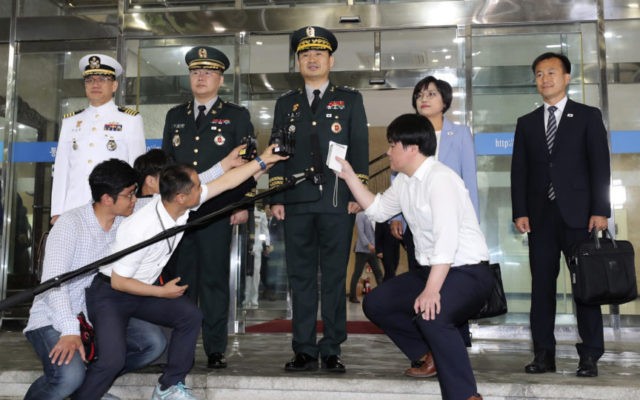Representatives of both Koreas began preliminary discussions Thursday on the potential denuclearization of Panmunjom, the “peace village” on the Korean border that hosted the first meeting between two Korean heads of state.
Both North and South Korea agreed to restore open lines between the militaries and expand communications to prevent maritime clashes during a meeting of top military leaders initially scheduled for May, but canceled by North Korea in response to ongoing joint military exercises between the United States and South Korea.
Japan’s Kyodo News reports that a joint Korean statement “said the two sides also exchanged opinions about demilitarizing the Joint Security Area at Panmunjom to ease tensions.” It did not elaborate on whether both sides agreed on any logistical provisions to make the demilitarization happen. Such a move would represent the first attempt to begin demilitarization of the border between the two countries, known as the Demilitarized Zone (DMZ) and widely considered the most heavily armed border in the world.
Yonhap News Agency, which noted that the talks were the first of their kind “in more than a decade,” reported that any demilitarization of the town would occur on a “trial basis,” according to those participating in the talks, but could expand into a larger demilitarization of the border.
The talks also included discussions on repatriating the remains of those killed during the Korean War that had not yet returned home, “halting all hostile acts against each other; turning the Northern Limit Line (NLL), a de facto sea border, into a peace sea; and other issues that the April declaration touched on to reduce military tensions.”
The agreement on repatriation of remains echoes a similar agreement that dictator Kim Jong-un reached with U.S. President Donald Trump during their historic summit Tuesday, in which North Korea agreed to return the remains of American prisoners of war/missing in action (POW/MIA) soldiers to the United States. This was one of the few concrete promises that Kim agreed to during that summit.
The talks were not all fruitful, however, according to the Yonhap version of events. The two sides did not agree on establishing a military hotline between both defense ministers. North Korea demanded that South Korea agree to an end in joint military exercises with the United States, which South Korea refused to do, instead “saying that it is a matter to be resolved through the process of building mutual trust, adding that related discussions are underway between Seoul and Washington.”
Yonhap also claims that the top North Korean negotiator at one point expressed extreme frustration, telling the South’s representatives, “let’s not ever have talks like this.”
Yet the Korean Central News Agency (KCNA), North Korea’s state media outlet, reported that North and South Korea were continuing to implement small steps towards normalizing relations, agreeing to continue to implement the provisions of a deal made on June 15, 2000.
“We will firmly adhere to the principle of national independence that we decide the destiny of our nation by ourselves, as clarified in the June 15 joint declaration and reaffirmed in the Panmunjom Declaration,” North and South Korea reportedly agreed on Friday.
KCNA has proven an unreliable narrator during the U.S.-North Korea talks. The North Korean state outlet, for example, claimed that President Trump agreed to lift sanctions on Pyongyang following his meeting with Kim, which Trump adamantly refused to do until denuclearization occurs and can be verified. On Friday, another North Korean outlet, the Japan-based Choson Sinbo, claimed that “complete, verifiable and irreversible dismantlement” of North Korea’s nuclear program was not on the table for Kim, only “complete denuclearization of the Korean peninsula,” which would include U.S. assets in the region.
Choson Sinbo‘s interpretation of the situation contradicts statements by U.S. Secretary of State Mike Pompeo, who has repeatedly insisted that verification is part of the denuclearization process.
Pompeo has also stated that joint exercises with South Korea would only end if North Korea ensures that “productive, good-faith negotiations” remain “ongoing” between the two countries.
President Trump told reporters Tuesday that the United States would “stop the war games, which will save us a tremendous amount of money.” He did not specify, however, which joint military exercises he counted as “war games” and which were necessary upkeep exercises.
South Korea responded with a presidential office statement claiming that Seoul needed “to figure out President Trump’s accurate meaning and intention of this comment.”
The Pentagon confirmed Thursday that Seoul and Washington are in close contact about whether to cancel upcoming exercises, the most recent to occur scheduled for August, the Ulchi-Freedom Guardian exercise.
“Nothing has been decided on the adjustment of the Ulchi-Freedom Guardian exercise. However, a position will be announced soon through close consultation between South Korea and the United States,” an unnamed high-ranking Seoul official told Joongang Ilbo.

COMMENTS
Please let us know if you're having issues with commenting.